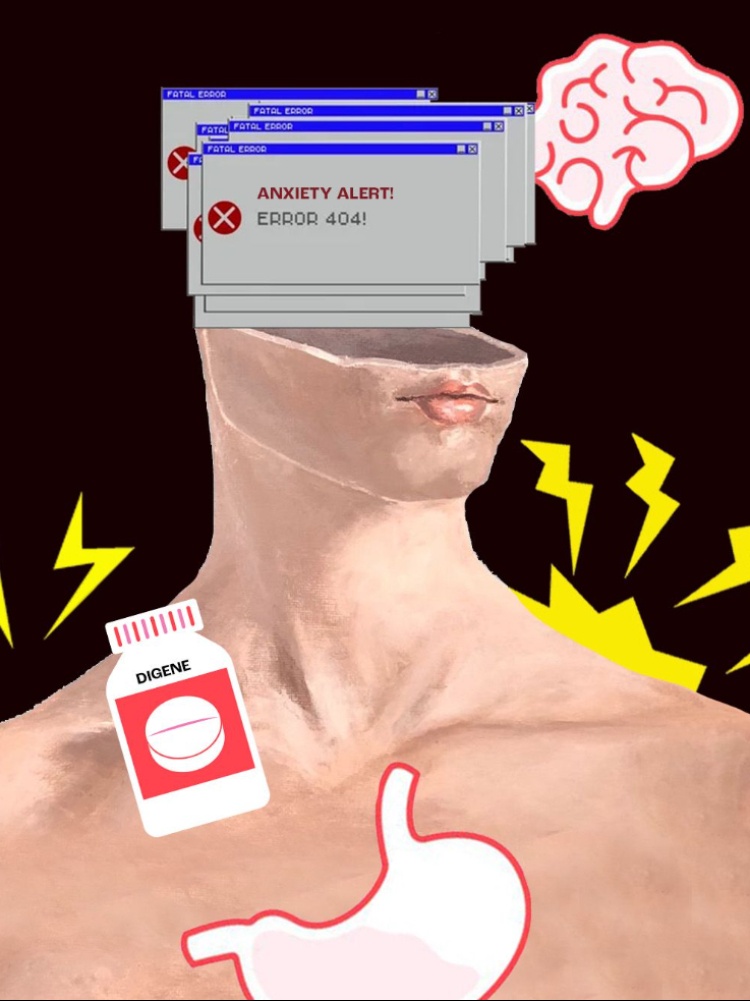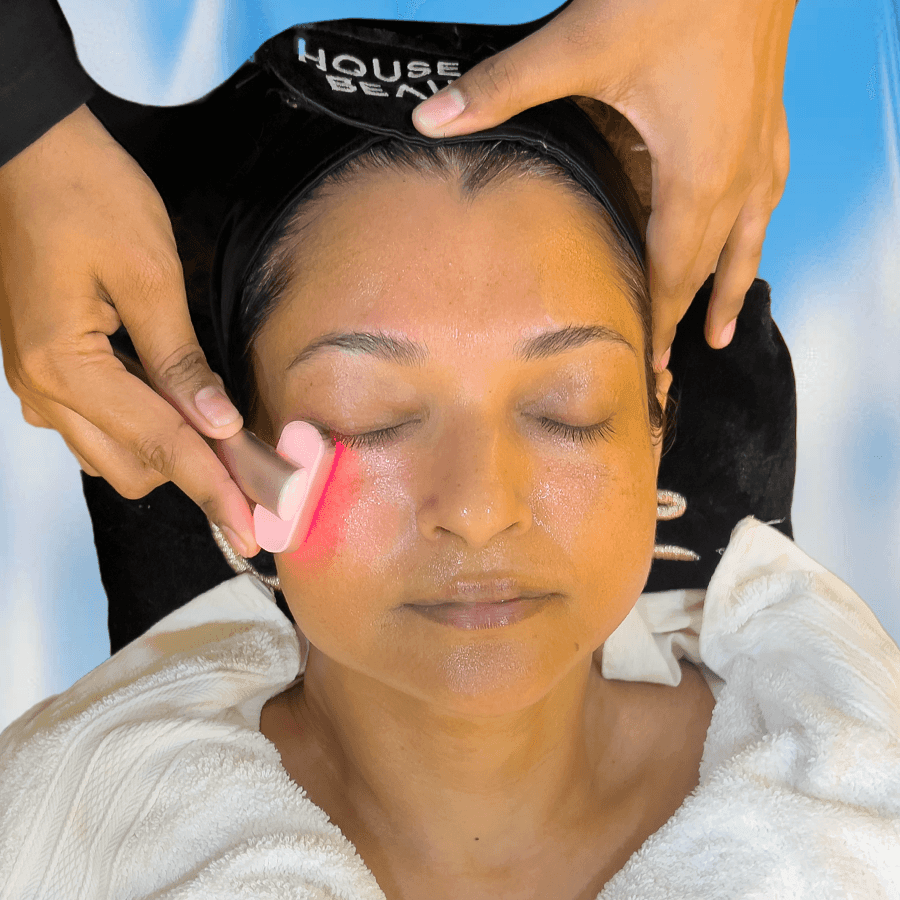After spending over two and a half decades living in my body, I can confirm that two distinct species of butterflies call my stomach home. The first type breaks into a ballroom dance when I’m sitting across someone I have a crush on or watching two fictional characters finally confess their feelings to each other. The other makes me feel like I’m on the terrifying pinnacle of a rollercoaster with no safety belts, about to drop any moment now.
The latter make themselves particularly known on travel days, bad days, before important occasions, or sometimes, for no reason at all. At such times, the thought of food makes my stomach churn, so I skip meals and consequently deal with the burn of upwardly travelling gut juices or some very unglamorous bloating. Turns out I’m not the only one. A number of people are increasingly struggling with gut-related psychosomatic symptoms that tend to be brushed off as a bad-food day. And while bingeing on fries at 11 pm may not be the best thing for a healthy gut, neither is a frenetic state of mind.
“It’s very common for individuals dealing with anxiety to experience gut and gastrointestinal issues. More often than not, my clients have reported ongoing or past gut-related symptoms that generally flare up during periods of heightened anxiety. Some of them have shared experiences of vomiting, retching, gagging, feeling bloated, suffering from stomach cramps or feeling a tightness in their stomach,” explains Dr Miloni Sanghvi Vakil, a Dubai-based counselling psychologist.
Kanika Ratnavokit, 28, first experienced nervousness and anxiety during high school—a more turbulent time than most of us would like to admit. “Anytime I experienced high-stress situations—like going up on stage for a performance or taking an exam or a flight—I noticed a pattern of acidity, indigestion, and bloating. I started forming this odd association between food, panic, and needing to go to the bathroom, which led me to lose about 5 kg because I became scared of eating,” she says. It was a long road to narrowing down the cause to mind-gut connection, despite seeing a number of gastroenterologists and homeopathic doctors prescribe probiotics or encourage a low-FODMAP diet.
Functional gastrointestinal disorders affect 35 to 70 per cent of people at some point in their lives, women bearing the brunt more often than men, according to a 2019 Harvard Health study. Despite no apparent physical cause detected—such as infection or other diseases—patients experience abdominal pain, bloating, nausea, constipation, and other discomfort.
“Most patients come to me after doing a series of tests, such as colonoscopy, endoscopy, blood work and so on, which don’t reveal anything chronically wrong with them physiologically,” says Rupinder Kaur, an Ayurveda and anxiety coach specialising in psychosomatic disorders. Yet, their symptoms persist. “Decoding the gut-mind connection is like a chicken-and-egg situation. Is my gut in bad shape because I’m stressed or am I stressed because my gut is in bad shape?” questions Kaur.
To get to the root of this, let’s throw it back to one of the first things we learnt in biology class—stress or anxiety, either real or perceived, triggers our sympathetic nervous system to activate its fight-or-flight response. Our internal resources are diverted to conserve energy, hence the shallow breathing, slow digestion, and increased heart rate. In fact, the gut has its own complex nervous system, known as the enteric nervous system, or the ‘second brain’, Dr Vakil explains. “The gut has trillions of bacteria that help regulate mood by producing some neurotransmitters, like serotonin, which is the mood-boosting chemical. We think serotonin is released from the brain, but it’s actually from the gut, so an imbalance or dysfunction in its bacteria can contribute to low mood, increased anxiety or irritability.”
Harshita Shah, 27, knows the impact of this dysfunction all too well as she went through periods of stress, emotional uncertainty, and loneliness when living abroad. In the midst of dealing with a painful breakup and having to navigate some career changes, Shah felt a constant uneasiness in her stomach irrespective of what she ate. “I’m not sure when things improved, but the symptoms stopped when what I was feeling went away. Probably the most helpful thing was having a routine and something to look forward to everyday,” she says.
In hindsight, what Shah had done, consciously or unconsciously, is activate her parasympathetic nervous system, which is responsible for rest, recovery, relaxation, and digestion. Contrary to the fight-and-flight state, this antagonistic system doesn’t feel as accessible when we’re stressed, explains Dr Vakil, who uses therapeutic approaches, including sensory-based grounding techniques that are affirming, help shift the attention, slow down racing thoughts, and create a sense of comfort.
A holistic approach is key to alleviating psychosomatic symptoms, and Kaur relies on Ayurvedic practices like Dhincharya (a routine based on phases of the day) and Ritucharya (a regimen or lifestyle based on the seasons) to help her patients. She also encourages a combination of meditation and movement to regulate our emotional and physical well-being. To that point, Ratnavokit is a huge advocate of regular walks, sound healing, yoga and Pilates classes. “I never go into those classes thinking ‘I need to fix my gut’. I just focus on showing up for myself in supportive ways—and then my symptoms tend to ease. It might sound obvious, but it takes a lot of self-awareness to notice how emotional regulation shows up in your body—especially with digestion,” she says.
So perhaps I can crack the code to a healthy mind-gut by giving my adrenaline-junkie butterflies their thrill-fix from a different source—a dance class, Pilates or a Hot Girl Walk, maybe? Anything that keeps them from turning my stomach into their personal theme park. In the meantime, I owe an apology to the takeaways I’ve cursed for my upset stomach and bouts of acid reflux— it’s not you, it’s me.







